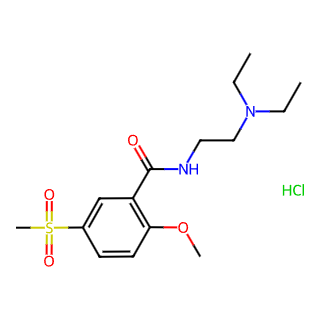- Synthetic anti-infective drugs
- Medications for the digestive system
- Antipyretic and analgesic drugs
- Medications for the blood system
- Medications for the respiratory system
- Anti-allergic drugs
- Medications for the urinary system
- Diagnostic medications
- Immunosuppressive and immunomodulatory drugs
- Vitamins and mineral supplements
- Antioxidants and medications for osteoporosis
- Antiparasitic drugs
- Ophthalmic medications
- Amino acids and their derivatives
- Dermatological medications
- Medications for the circulatory system
- Antitumor drugs
- Medications for the nervous system
- Hormonal and endocrine function-regulating drugs
- Antibiotics
- Others
CAS No.: 51012-33-0




Basic Information
Chemical Name: Tiapride Hydrochloride
CAS Number: 51012-33-0
Molecular Formula: C15H25ClN2O4S
Molecular Weight: 364.88 g/mol
Pharmacological Effects
Tiapride is classified as an atypical antipsychotic and is primarily used to treat various neurological and psychiatric disorders. Its main pharmacological effects include:
1. Dopamine D2 Antagonism:
o Tiapride is known to have a high affinity for dopamine D2 receptors. It acts as an antagonist, reducing activity at these receptors.
o This mechanism is particularly beneficial for managing symptoms associated with psychomotor agitation and aggressive behavior.
2. Antipsychotic Effects:
o Tiapride is utilized for its antipsychotic properties, especially in treating conditions like schizophrenia, Huntington's disease, and certain behavioral disorders in the elderly.
o It helps alleviate symptoms such as hallucinations, delusions, and thought disturbances.
3. Sedative and Anxiolytic Properties:
o Tiapride exhibits sedative and anxiolytic effects, helping to calm agitated patients.
o It is used to reduce anxiety and promote relaxation without causing significant drowsiness.
4. Motor Function Improvement:
o Patients with conditions like Tourette syndrome or motor tics benefit from Tiapride, as it helps reduce involuntary movements and tics.
o It is also beneficial in treating dyskinesia, particularly in patients with Parkinson's disease.
5. Alcohol Dependence Treatment:
o Tiapride has been utilized to manage alcohol dependence, reducing cravings and withdrawal symptoms.
6. Gastrointestinal Effects:
o By modulating dopamine receptors in the gastrointestinal tract, Tiapride may improve gastrointestinal symptoms such as nausea and vomiting.

Tai Yau Street, San Po Kong, Kowloon, Hong Kong, China.



